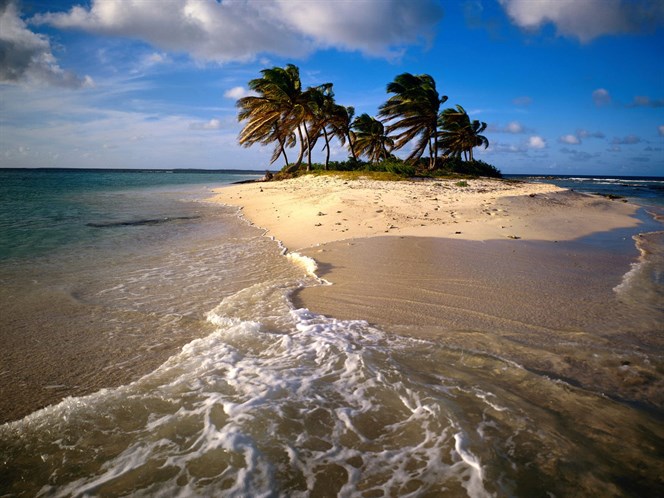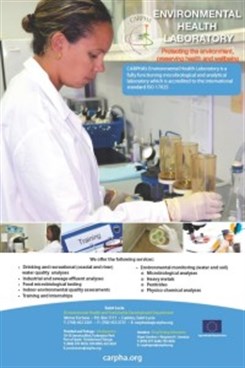CARPHA COLLABORATES TO PROTECT THE CARIBBEAN’S OCEANS
Fuente: http://caricom.org/
In observance of World Oceans Day which is celebrated on June 8 each year we take a look at the work that one of our Community Institutions, Caribbean Public Health Agency (CARPHA), is doing to help protect the Region's oceans. CARPHA is the inter-governmental arm of CARICOM with responsibility for the delivery of public health in the Caribbean Region. The agency became operational in January 2013 and represents an amalgamation of five Regional health institutions each having over 30 years of experience operating in the Caribbean. The Environmental Health and Sustainable Development Department (EHSD) based in Saint Lucia leads the environmental protection and natural resources management initiatives and functions as the nexus between health and the environment.

Credits: Sandy Island, Anguilla, the Caribbean.
Through partnership with the German Development Cooperation (GIZ), CARPHA is jointly implementing the Caribbean Aqua-Terrestrial Solutions (CATS) programme in eight CARICOM/CARPHA Member States. One component of the programme directly involves conservation of marine biodiversity and coastal resources. EUR 5.000.000 has been invested in the development/enhancement of marine managed areas - governance and sustainable financing mechanisms; education and awareness programmes; and development or support for sustainable livelihoods from responsible use of our oceans.
The other component of the programme focuses on terrestrial resources management with EUR 5.525.000 invested in a holistic approach to resource management and prevention of pollution of the marine environment from land-based sources and activities. This is of critical importance to our Region since studies conducted over the last 30 years have indicated that pollution from land-based activities such as sewage, agricultural run-off and liquid waste from industries, are the main contributors to marine degradation.
CARPHA's environmental health laboratory is working with national governments, private hoteliers and other establishments to monitor the impacts of effluents on the marine environments and conduct assessments of threats to health and ecosystem functionality.
 |
Coastal and marine water quality monitoring as well as freshwater bodies (rivers) and point sources of pollution are monitored to determine the influx of pollutants and derive appropriate mitigation measures to reduce the threats to human health and the environment. This is exemplified by year-round monitoring of the effluent of sewage treatment plants of hotels and water quality of the receiving marine environments, training of national regulatory personnel, operators of facilities and laboratory staff in water quality monitoring. |
The terrestrial component of the CATS programme is established in watershed areas adjacent to the coastal areas in which the marine component is focused, resulting in complementarity and synergy of all our activities to produce a classic ridge-to-reef approach to pollution prevention. This is exemplified by the sustainable land management initiatives and reef guardian concept among the North-East Farmers Organisation (NEFO) in the Molinière-Beauséjour watershed, St. George’s north east, Grenada and Molinière-Beauséjour Marine Protected Area, where the institutional and management capacity was enhanced and suite of tools developed to sustainable manage the marine resources.
Additionally, CATS recently invested significant resources in the development of marine managed areas guidelines for CARICOM to be used by all Member States. CARPHA is currently working with the United Nations Environment Programme – Caribbean Environment Programme (UNEP – CEP) and GIZ for the management of marine litter, which has been a major concern in our Region.
The management of solid waste to reduce impacts on the marine environment has been the focus of many of our solid waste management initiatives and will continue in the future. We have developed and submitted projects to international development partners in collaboration with those here mentioned, amounting to US$5M each for the management of marine litter.
This is in addition to the Global Environment Facility (GEF) Caribbean Regional Fund for Wastewater Management (CREW+) project for which CARPHA is collaborating with UNEP and the Inter-American Development Bank, for the management of wastewater (long determined to be the number one threat to the marine environment) in the Caribbean.
The Environmental Health and Sustainable Development Department has also been involved in the promotion of ecosystem based adaptation for building resilience to climate change in the Caribbean Region. This initiative, in collaboration with Blue Solutions, focuses on the restoration and protection of coral reefs and coastal ecosystems such as mangrove stands, to reduce projected impacts of climate change on our Region such as increased intense storms and storm surges, on our vulnerable coastline.
CARPHA has been partnering with a number of Regional and international agencies for the advancement of the SDG 14 (life below water) and the associated SDG 13 (climate action) and SDG 15 Life on land to protect and enhance the marine environment of the Region.
This is significant for the Caribbean because our Member States consist of vulnerable ecological systems contained within marine spaces that are many times more than their land masses. The work of CARPHA in this Region entails the management of the environmental determinants of health (principally the broad definition of health to include physical mental and social well-being).
The entire marine environment of this Region is important for the sustenance of health and well-being. The work of the EHSD, in particular the thematic programme areas, covering protection of natural resources, pollution prevention and livelihoods promotion, is tied into the theme of World Oceans Day which is ‘Healthy Oceans, Healthy Planet’.








